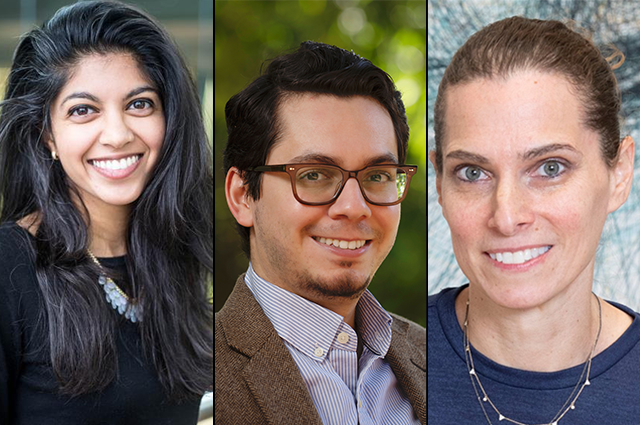New BME faculty

The Department of Biomedical Engineering welcomes two new faculty members. Assistant Professor Nisha Iyer and Assistant Professor Juan Gnecco bring research expertise in stem cells, disease modeling, and reproductive biology and tissue engineering.
Dr. Nisha Iyer is an Assistant Professor in the Department of Biomedical Engineering at Tufts University. Her research interests are at the intersection of developmental biology and regenerative medicine, using stem cells to understand and advance neural repair. She received her BS from Johns Hopkins University and PhD from Washington University in St. Louis in Biomedical Engineering.
As an NIH-NINDS F31 Predoctoral Fellow working with Dr. Shelly Sakiyama-Elbert, she used CRISPR gene-editing in mouse stem cells to generate spinal locomotor interneurons for in vitro modeling and transplantation. Dr. Iyer conducted her postdoctoral research with Randolph Ashton at the Wisconsin Institute for Discovery at the University of Wisconsin--Madison, where she was a Stem Cell and Regenerative Medicine Center and NIH-NINDS F32 Postdoctoral Fellow. There she developed translatable methods to derive regionally and phenotypically specified hindbrain, spinal cord, and peripheral tissues from human pluripotent stem cells.
Her lab now focuses on how regional specificity impacts development, degeneration, and regeneration in the central nervous system and beyond, developing biomanufacturing strategies and organoid technologies to direct cell therapy research. Dr. Iyer is also a passionate educator who seeks to lower barriers to higher education in STEM and to engage the broader community in conversations about science and society.
Dr. Juan S. Gnecco is an Assistant Professor in the Department of Biomedical Engineering. As the principal investigator of the Laboratory of Reproductive Engineering, Dr. Gnecco’s lab focuses on interdisciplinary and translational research by implementing engineering approaches and technologies to uncover the fundamental cellular and molecular mechanisms regulating women’s reproductive health. His research interest lies at the interface tissue engineering and reproductive biology to understand the inflammatory processes involved in both reproductive physiology and disease pathogenesis.
Dr. Gnecco obtained his BS in Biotechnology from Rutgers University, and a PhD in Cellular and Molecular Pathology from Vanderbilt University Medical Center (VUMC) under the mentorship of Dr. Kevin Osteen. In his PhD thesis, he developed the first organ-on-chip model of the perivascular endometrium and deployed this microphysiological systems (MPS) to illuminate the inflammatory effects exerted by environmental toxicants on the female reproductive tract. Dr. Gnecco then conducted his post-doctoral training at Massachusetts Institute of Technology (MIT) with Dr. Linda Griffith in the Department of Biological Engineering.
At MIT, Dr. Gnecco led efforts to transform the human clinical relevance of 3-dimensional (3D) reproductive tract models by defining the interplay between biophysical and biochemical cues on cell behavior. To do so, he developed synthetic extracellular matrices and organoid technologies that helped model and interrogate the tissue microenvironment in vitro. In parallel, he initiated and led an effort to define the tissue structure and composition of the human endometriotic (adenomyosis) lesions in 3D using tissue clearing and light-sheet imaging approaches.
He has been awarded three rounds of funding from Gates Foundation (2018-present) for his work building phenotypic screening models of the female reproductive tract. He has been an invited speaker at the Society for Reproductive Investigation (2020/2021), the Gates Foundation Global Health Integrative Organoid Consortium (2021) and was selected as a Rising Star in Engineering and Health by Columbia University (2020). He serves on the editorial board for Frontiers in Reproductive Health.
Dr. Gili Naveh is an associate professor at Tufts University School of Dental Medicine, and was recently named to a secondary appointment in the Department of Biomedical Engineering. Dr. Naveh received a master's of science in dentistry from Boston University, a master of science from Hebrew University of Jerusalem, a Doctor of Medicine in Dentistry from Tel Aviv University, and a PhD from the Weizmann Institute of Science.
The Naveh lab is an interdisciplinary lab focused on studying the 3D structure and function of the periodontal ligament and extracellular matrix. In the lab researchers combine different modalities of imaging, 3D image analysis, mechanical testing and tissue composition analysis. These modalities include microCT, AFM, Light sheet, multiphoton microscopy, proteomics and Raman spectroscopy. Their approach is focused on understanding the micro and mesoscale to achieve macroscale functional manipulations that can be translated to the clinical setting.
Department:
Biomedical Engineering